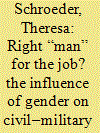| Srl | Item |
| 1 |
ID:
175820


|
|
|
|
|
| Summary/Abstract |
As more women attain executive office, it is important to understand how gender dynamics affect international politics. Toward this end, we present the first evidence that gender stereotypes affect leaders’ abilities to generate audience costs. Using survey experiments, we show that female leaders have political incentives to combat gender stereotypes that women are weak by acting “tough” during international military crises. Most prominently, we find evidence that female leaders, and male leaders facing female opponents, pay greater inconsistency costs for backing down from threats than male leaders do against fellow men. These findings point to particular advantages and disadvantages women have in international crises. Namely, female leaders are better able to tie hands—an efficient mechanism for establishing credibility in crises. However, this bargaining advantage means female leaders will also have a harder time backing down from threats. Our findings have critical implications for debates over the effects of greater gender equality in executive offices worldwide.
|
|
|
|
|
|
|
|
|
|
|
|
|
|
|
|
| 2 |
ID:
160625


|
|
|
|
|
| Summary/Abstract |
The purpose of this study is to investigate the impact of women in politics on the risk of a coup d’état. Previous research indicates that the relationship between female political leaders and security is dependent on the office she holds. Subsequently, we expect female legislators to have a different influence than a female chief executive on the likelihood of a coup. We argue that a higher level of female representation reduces the risk of a coup d’état. However, we assert that a female chief executive has a different effect and increases coup risk. Using data covering 160 states over the years 1952 to 2009, our empirical tests provide support for our expectations. All else being equal, increased levels of women in parliament lead to a substantial drop in coup likelihood. However, the argument that a female chief executive will be more coup prone is not fully supported in our findings.
|
|
|
|
|
|
|
|
|
|
|
|
|
|
|
|